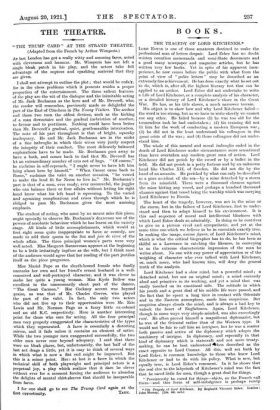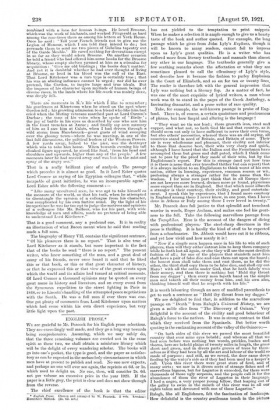BOOKS.
THE TRAGEDY OF LORD KITCHENER.* Loan ESW4a is one of those amateurs destined to make the professional man of letters despair. Lord Esher has no doubt written countless memoranda and semi-State documents and a good many newspaper and magazine articles, but ho has written very few books. Yet in spite of his apparent inex- perience, ho now comes before the public with what from the point of view of " polite letters " may be described as an extremely fine achievement. Ho has done exactly what he set out to do, which is, after all, the highest literary test that can be applied to an author. Lord Esher did not undertake to write a Life of Lord Kitchener, or a complete analysis of his character, or a detailed history of Lord Kitchener's share in the Great War. Ho has, as his title shows, a much narrower terrain.
His object is to show how and why Lord Kitchener failed— the word is too strong, but as we have to write shortly we cannot use any other. He failed because (1) ho was too old for the tremendous task ho had undertaken ; (2) his training did not fit him for the work of conducting a modern European war ; (3) he did not in the least understand his colleagues in the great crisis of the war ; and (4) those colleagues did not under- stand him.
The whole of this mental and moral imbroglio ended in the death of Lord Kitchener under circumstances more sensational than have overtaken any modern great man of action. Lord Kitchener did not perish by the sword or by a bullet in the field. He did not perish in a petty fortress and by an unknown hand like Charles XII. of Sweden. He did not die by the hand of an assassin. He perished by what can only be described as a pure accident of the sea—by a mine detached by a storm from its minefield. There were a thousand chances against the mine hitting any vessel, and perhaps a hundred thousand chances against that vessel being the warship which was carrying Lord Kitchener to Russia.
The heart of the tragedy, however, was not in the mine or the storm, but in the failure of Lord Kitchener, first to under- stand and then to adapt himself to his environment. It is this sad sequence of moral and intellectual blindness with which Lord Esher deals so admirably. In doing so ho contrives to give us a picture vivid and sympathetic, and yet at the same time one which we believe to be in essentials exactly true. In making the image, anima figure, of Lord Kitchener's mind, which is what the critical biographer has to do, he has been as skilful as a Lawrence in catching the likeness, in conveying to us the extreme characteristic impression of the man he writes about. No one with any power of appreciation or of the weighing of character who ever talked with Lord Kitchener, or, much more, who had known him, will deny the general truth of the analysis.
Lord Kitchener had a slow mind, but a powerful mind ; a detached mind, but not an original mind ; a mind curiously aloof and primitive in its working, and yet a mind that was easily touched on its emotional side. The solitude in which his youth and a great deal of his middle life were passed, and the fact that ho spent a long time in contact with Orientals and in the Eastern atmosphere, made him suspicious. But suspicion always clouds the mind, and is always a bad key to unlock the heart of Englishmen. Again, Lord Kitchener, though in some ways very simple-minded, was also exceedingly ruse. He often proved himself a magnificent diplomatist, but
he was of the Oriental rather than of the Western type. It would not be fair to call him an intriguer, but ho was a master both passive and active of the diplomacy which adopts the machinery of intrigue. In diplomacy, and especially in that kind of diplomacy which is statecraft and not more treaty- making, he can be best understood 4then described as the exact opposite to Lord Cromer. All this, well set forth by Lord Esher, is common knowledge to those who knew Lord Kitchener or had to do with his policy. What is new, but equally true, is Lord Esher's comment. In it he shows that the real clue to the labyrinth of Kitchener's mind was the fact that he cared little for men, though a great deal for things. '
"Persistently he cared for things—objets, as the French call them—and this form of self-indulgence is perhaps rarely.
• The Tragedy of Lord Roamer. By Reginald Vbcount Esher. London : John Murray. MC ed. net.)
combined with a love for human beings. Ho loved Broome, which was the work of his hands, and worked Fitzgerald as hard among the rose-trees there as among his letters at York House. Once he said : Tell your French friends not to give me the Legion of Honour, which I am told they intend to do ; but persuade them to send me two pieces of Gobelins tapestry out of the Garde Meublo.' He cared nothing for decorations except in so far as they would adorn Broome. On another occasion he told a friend who had offered him some books for the Broome library, whose empty shelves yawned at him as a stimulus for acquisition : Give me old bindings ; the books don't matter.' And yet it is doubtful whether he had ever thought of living at Broome, so loud in his blood was the call of the East. That Lord Kitchener was a rare type is certainly true • that his was an abiding influence cannot be urged ; nor did he ever pretend, like Gordon, to inspire large and true ideals. But the impress of his character upon myriads of human beings of diverse races, in the lands where his life-work was mainly done, was deeply felt.
There are moments in K.'s life which I like to remember ; his gentleness at Khartoum when he stood on the spot where Gordon fell ; his growling admission to a friend who like him had cried when the Mutiny veterans marched past at Lord Curzon's Durbar ; the tone of his voice when he spoke of ` Birdie ' the joy of battle in his eyes as described by one who saw hill:: in the front trenches at Anzac ; and finally my own memory of him as I saw him at Calais, when I had driven through a wild storm from Hazebrouck—great gusts of wind sweeping over the gloomy town—where he was meeting, in one of the last full discussions, the political loaders of the Western Powers. A few yards away, lashed to the pier, was the destroyer which was to take him home. When towards evening his tall cloaked figure appeared, he stood like Saul, ` from his head and shoulders and upwards, higher than any of the people.' A few moments later he had moved away and was lest in the mist and spray of the angry sea."
That is a really brilliant piece of analysis. The passage which precedes it is almost as good. In it Lord Esher quotes Lord Cromer as saying of his Egyptian colleague that, " while incapable of great initiative, he was an incomparable agent."
Lord Esher adds the following comment :—
" Like many uncultured men, he was apt to take himself as the measure of the world, so that his task, when he attempted to disentangle the opinion of a colleague from his character, was complicated by his own furtive mind. By the light of his inexperience he was far too apt to judge the motives and opinions of a colleague like Mr. Balfour, who for his part, with wide knowledge of men and affairs, made no pretence of being able to understand Lord Kitchener."
That is a good comment, nay a profound one. It is in reality an illustration of what Bacon meant when he said that reading made a full man.
The biography of Henry VIL contains the significant sentence, " Of his pleasures there is no report." That is also true of Lord Kitchener as it stands, but more important is the fact that of the books he read " there is no report." The present writer, who knew something of the man, and a great deal of many of his friends, never once heard it said that he liked this or that book, or this or that great character of history, or that he expressed this or that view of the great events upon which the world and its affairs had turned at critical moments. Of Lord Cromer a thousand opinions may be quoted on every great name in history and literature, and on every event from the Syracusan expedition to the street fighting in Paris in 1848, or to Lincoln's handling of the attempted peace negotiations with the South. Ho was a full man if ever there was one. One got plenty of comments from Lord Kitchener upon matters which had come within his own direct experience, but very little light upon the past.



































 Previous page
Previous page